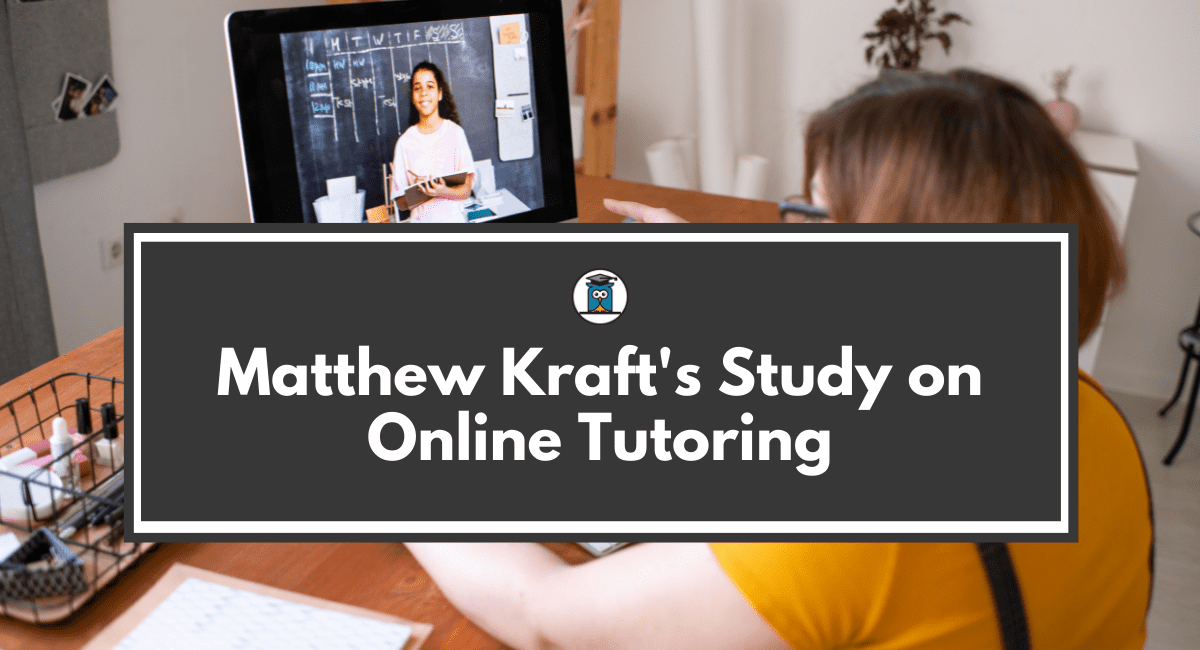A recent pilot study by Matthew Kraft—a Brown University Professor—shows promising potential around utilizing online tutoring to reverse pandemic learning losses and provide more accessible educational resources.
Supporting students with supplemental academic resources is critical—now more than ever—as students and educators alike continue struggling to get back on their feet as they return to in-person learning.
The demand for accessible & affordable educational mentoring
This study went off the premise that the U.S. public education system isn’t placing adequate value on individualized academic instruction.
According to the researchers, this type of mentoring is one of the most effective types of educational interventions. In addition, they note that students having positive relationships (with educational mentors—i.e. tutors) is important for “fostering students’ motivation, self-regulation, self-identity, and psychological well-being.”
Evidently, private tutoring is not equally accessible to all. Globally, private tutoring is a $124 billion industry (Global Industry Analysts, 2020). Although the number of private tutoring centers in the U.S. has grown significantly throughout the last couple decades, the majority of these have been in high-income communities.
The demand for tutoring highlights the effectiveness of tutoring in general, but also points to the inequity of this industry. Thus, this study aimed to formulate a solution for providing more accessible individualized academic instruction by looking at revamping tutoring programs.
This study was an initial test of “the efficacy of low-cost online tutoring models” within the school day. As the researchers point out, two—continual— limitations when addressing COVID-19 consequences are high program costs and a deficient supply of local tutors. Using volunteers significantly reduces program costs that otherwise would go toward tutor compensation.
Other benefits to online tutoring—as the researchers note—include:
- An expanded pool of tutors
- Less time/costs spent commuting
- More flexible work schedules
- Potential to better pair students with tutors “based on interests, expertise, and background”
High-dosage tutoring with volunteers
In the current study, college students from competitive universities volunteered as tutors in a one-on-one space twice a week for 30 minutes during the school day. They mainly worked with low-income students of color.
Both the current and prior research concludes that high-dosage tutoring is the best way for tutoring to positively impact students’ academic performance. In the current study, students who spent more time attending tutoring sessions advanced more than those who spent less time attending sessions.
And although the results of this study weren’t statistically significant—likely because most students didn’t receive enough tutoring hours overall—the research offers important information and learning points regarding online tutoring.
This study serves as a testament to show that recruiting volunteers to be online tutors is a low-cost model that has the potential to support more students. In addition, findings illustrate that low-cost online tutoring can be useful during the school day for both remote and in-person learning. 
This study also pointed out that using college students and volunteers is a good way to cut costs in online tutoring, but in most cases, they won’t be able to comprise the entire tutoring staff.
Key takeaways that highlight the main necessary components from Matthew Kraft’s research on offering online tutoring include:
Access to online tutoring for all students
Although school-wide access to this resource may be difficult if funds and/or tutors are limited, offering tutoring to all students is beneficial in that it helps advance the idea of tutoring as a “core practice” rather than an extra resource.
One option for institutions where this isn’t possible is to determine the specific grades struggling the most, and then provide tutoring to all students in those grades.
Necessity of consistent & frequent online tutoring sessions
Kraft notes the importance of students maintaining a sustained relationship with their tutor/mentor. This means that a pairing between a student and tutor should remain the same.
This way, students and tutors get the opportunity to, over time, develop a genuine connection. As a result, student will feel more comfortable voicing their questions and challenges, and the tutor will also feel more comfortable communicating and providing feedback.
Having frequent sessions is also an important feature of online tutoring, as an increase in tutoring hours is linked to higher exam scores and achievement.
Providing online tutoring during the school day
In addition, Kraft recognizes that it’s ideal for sessions to be provided during the school day, which caters more to those students who are less confident about seeking help.
Kraft says that having tutoring available anytime is beneficial for more confident students (who may have no trouble reaching out and scheduling an after-school session), but it could result in consequences “for student outcomes with the students who most need individualized instruction and support and are least willing and able to take advantage of those additional services.”
Ensuring online tutoring is individualized
If possible, it’s ideal to offer tutoring services with low student-to-tutor ratios. According to the study, a preferable ratio is 2:1 (student-to-tutor), and it should be no higher than 4:1. This structure allows tutors to most effectively cater their lessons to the students’ unique needs.
One reason why one-to-one or very small group tutoring is ideal is that it provides students with a comfortable space to ask questions. For many students, it can be overwhelming to voice questions and concerns in a classroom (or Zoom) full of other students.
With one-on-one tutoring, students may feel less shameful or doubtful when speaking up.
In addition, one-on-one tutoring allows the tutor and student to move at a more personalized pace. That is, you’ll be catering to only one student, which means there’s no pressure to look at other students’ levels—so you’ll spend less energy trying to cater lessons to several different levels.
Offering ongoing online tutor training
Another important component is providing tutors with training to improve competence and tutoring sessions. Mentoring the mentors may seem counterintuitive, but really, offering tutors online teaching tips is a necessity—this may be a foreign learning space for them, so it’s crucial to support them in their new position.
Kraft says that, “You want to scaffold or work with high-quality instructional materials that, ideally, are aligned with the instruction that students are receiving during their traditional classes.”
Defining terminology around high-dosage tutoring
Kraft touches on the importance of defining “high-dosage tutoring”. According to Kraft, exceptional, high-dosage tutoring should include:
- High-dosage execution (three or more sessions weekly)
- A focus on fostering tutor-student relationships
- Developmental assessments
- Alignment with school curriculum
- Tutor training
The study’s results
While this study can’t immediately fix all problems in education—particularly pandemic related learning losses—the empirical results were promising:
- Students with tutors saw their GPA increase by .06 – .48 GPA points,
- Were 18% – 35% less likely to fail a course,
- And were 10 – 25 percentage points more likely to attend college.
Essentially, the researchers recognize that this isn’t a concluding study, but a starting point for us to go from—and hopefully use to promote further understanding of online learning.
Becoming an online tutor is a great way to both pursue your passion for teaching while leaning into the huge demand for combatting learning losses. At My Private Professor, we are always looking to meet prospective tutors who can help us achieve our goal of maximizing student impact.
While we are always looking to meet prospective tutors who can help us maximize student impact, My Private Professor also partners with different companies, non-profits, and educational institutions to provide our tutoring services and continue helping students mitigate learning losses and achieve their potential.
Author: Lydia Schapiro







